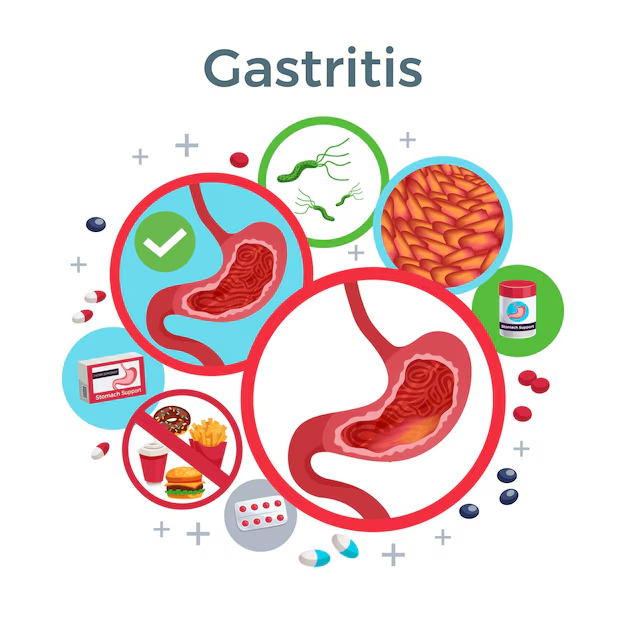Managing Acidity-Related Complications with Ayurveda
Managing Acidity-Related Complications with Ayurveda Acidity, characterized by a burning sensation in the stomach and chest, is a common ailment affecting millions worldwide. In Ayurveda, acidity is understood as a Pitta dosha imbalance, where excessive heat accumulates in the stomach, leading to symptoms like heartburn, acid reflux, and indigestion. While modern medicine offers effective treatments, Ayurvedic principles provide holistic approaches that not only alleviate symptoms but also address the root cause of acidity-related complications.
Understanding Acidity in Ayurveda
Ayurveda, the ancient Indian system of medicine, views health as a balance between three fundamental energies or doshas: Vata, Pitta, and Kapha. Pitta, governed by the elements of fire and water, regulates digestion and metabolism. When Pitta dosha becomes aggravated due to factors like improper diet, stress, or lifestyle choices, it can lead to acidity.
Acidity in Ayurveda is referred to as Amlapitta, where ‘Amla’ means sour or acidic and ‘Pitta’ denotes the dosha involved. According to Ayurvedic texts, Amlapitta is caused by an imbalance in the Agni (digestive fire) and accumulation of excessive Pitta in the digestive tract. This imbalance manifests as symptoms such as sour belching, heartburn, nausea, and a burning sensation in the stomach or throat.
Ayurvedic Remedies for Acidity

Ayurvedic treatment for acidity focuses on restoring balance to Pitta dosha and strengthening digestive fire. Here are some effective remedies and practices:
1. Dietary Adjustments
- Avoid Pitta-aggravating Foods: Spicy, sour, and salty foods can exacerbate acidity. Opt for cooling foods like cucumber, coconut, and leafy greens.
- Herbal Teas: Drink teas made from herbs like licorice (Yashtimadhu), coriander, or fennel to soothe the stomach lining.
- Aloe Vera Juice: Consuming a tablespoon of aloe vera juice before meals can help reduce acidity.
2. Lifestyle Modifications
- Manage Stress: Practice relaxation techniques such as yoga, meditation, or deep breathing to reduce stress levels, which can aggravate Pitta.
- Maintain Regular Meal Times: Eating meals at consistent times helps regulate Agni and promotes better digestion.
- Stay Hydrated: Drink plenty of room temperature or lukewarm water throughout the day to aid digestion.
3. Ayurvedic Herbs and Formulations
- Triphala: A blend of three fruits (amla, bibhitaki, and haritaki) known for its detoxifying and digestive properties. It helps balance all three doshas and promotes healthy digestion.
- Shatavari (Asparagus racemosus): Known for its cooling and soothing properties, Shatavari helps reduce inflammation in the stomach lining and promotes healing.
- Yashtimadhu (Licorice): Acts as an antacid and helps protect the stomach lining from acid damage.
Ayurvedic Practices for Long-Term Management
Beyond immediate relief, Ayurveda emphasizes long-term lifestyle practices to prevent acidity recurrence:
1. Daily Routine (Dinacharya)
- Oil Pulling: Swishing coconut or sesame oil in the mouth for a few minutes each morning helps detoxify and balance oral and gut microbiota.
- Tongue Scraping: Scraping the tongue with a copper tongue cleaner removes toxins (ama) and enhances taste perception.
2. Seasonal Cleansing (Ritucharya)
- Seasonal Detox: Undertake seasonal detoxification routines (Panchakarma) under the guidance of an Ayurvedic practitioner to eliminate accumulated toxins and restore balance.
3. Yoga and Pranayama
- Asanas: Practice gentle yoga postures like Pawanmuktasana (wind-relieving pose) and Vajrasana (thunderbolt pose) to aid digestion and relieve acidity.
- Pranayama: Incorporate deep breathing exercises such as Bhramari pranayama (humming bee breath) to calm the mind and reduce stress-induced acidity.
Conclusion
Managing Acidity-Related Complications with Ayurveda offers a comprehensive approach to managing acidity by addressing both symptoms and underlying imbalances. By adopting Ayurvedic remedies, dietary adjustments, and lifestyle modifications, individuals can effectively manage acidity-related complications while promoting overall well-being. It’s essential to consult with a qualified Ayurvedic practitioner to personalize treatment plans based on individual constitution (prakriti) and specific imbalances. With its holistic principles and natural remedies, Ayurveda provides a valuable complement to modern medical treatments in managing acidity and promoting digestive health.









Leave a reply